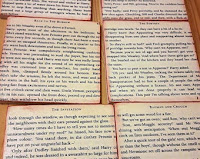Essay Writing is an integral part of examinations. It is generally meant
to test the ability to think and structure the thoughts systematically.
I will explain here how to approach a topic and accomplish it with ease.
Once you learn the ‘what’, the ‘how’ becomes a piece of cake.
Essays can be of variant types and styles. For now, let’s categorise it under four heads:
a) Argumentative Essays- I find this the simplest option and most
marks fetching. This is the type where you are supposed to choose a side and
write either for or against the motion.
b) Narrative Essays- Such a topic asks you to narrate an incident.
The best way to approach it is the ‘5Ws and an H’ formula. That is, frame
your article by asking yourself What, Where, When, Why,
Who and How related to the incident that you will be writing
about.
c) Descriptive Essays- The reader or examiner expects you to
describe something or somewhere, it may be an experience or a visit to any
place.
d) Reflective Essays- These are thought-provoking topics, you
might be asked to justify or talk about its relevance in your life or present
times.
Once you’ve decided on a topic of your choice, it’s time to start
putting the pieces together. The approach for the above mentioned four
different types of essays shall be different.
On a broad basis, this is what
you can do that works for all-
1) Write a plan, it’s a must (even if it’s in a rough section).
This will not only help you save time but your ideas shall appear coherent.
 2) Begin with a quote or try an effective statement. For example,
if the topic is 'A Bicycle Ride', the introductory sentence can vary from:
2) Begin with a quote or try an effective statement. For example,
if the topic is 'A Bicycle Ride', the introductory sentence can vary from:
“Every time you miss your childhood, ride a bicycle!” -Mehmet Murat
OR
It was a bright day, apt for a field trip. Without much delay, I
proposed the idea of riding to the Jayprakash Udyan, to my sibling. It was
time to dust our bicycles!........
OR
Bicycle rides are always fun but I’ve a contrasting tale to narrate. What
should have been a frolic filled day for me turned out to be one of the most
awful incidents of my life.......
3) One paragraph one idea. Do not overdo, it’s a complete
no-no. Four to five sentences in a
paragraph. That’s it.
5) Stick to the same tense throughout. If it’s past tense that
you begin the composition with, maintain the same till the end.
6) Smooth flow of sentences is important. Words like
nevertheless, however, therefore, consequently, furthermore are referred to as Linkers.
You might want to use them. No being wordy, though.
7) Maintain the chronology or a sequence of events. What happened
first must be mentioned first and then the following incident. Thus giving a
proper shape to your narration, else it might come out disorganized.
8) Write short sentences. This will ensure
accuracy of spelling, grammar and punctuation.
9) Choose a topic that you are familiar with.
Something that you can relate to is expressed better.
10) Introduction and conclusion hold equal
importance. Mention what happened in the end or what was the ultimate outcome
or how did it all come to an end. If it's argumentative, justify the
advantage/disadvantage with a closing statement.
Ending with a quote is an option too.


This blog of yours is really helpful to students. Very well explained and informative.😃👍
ReplyDeleteThank you
ReplyDelete😃👍
DeleteThank you miss it is really very helpful for us...!!😊
ReplyDeletepleasure
DeleteThank you miss for uploading this blog
ReplyDelete👍
DeleteAdvantageous tips.
ReplyDeletethanks
DeleteIt's really helpful for students. Very well explained
ReplyDeleteThank you
DeleteThat's what I was looking for... Wonderful 👍👍
ReplyDeleteVery good!!
ReplyDeleteMiss could you please publish a blog on the topic-
ReplyDeleteThe importance of moral Education
This comment has been removed by the author.
DeleteIts not possible to write the entire essay at the moment. However, here are some points that might help:Begin with giving your views as to what is Education
DeleteIt's a vast term and encompasses more than just academic excellence.
Build on the moral aspect in the 2nd paragraph, what are morals and why do they form an indispensible part of our life.
Further give examples as to what happens if that aspect is neglected.
End the composition on a positive note.